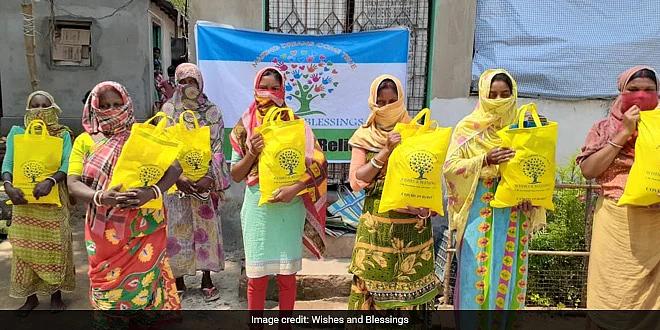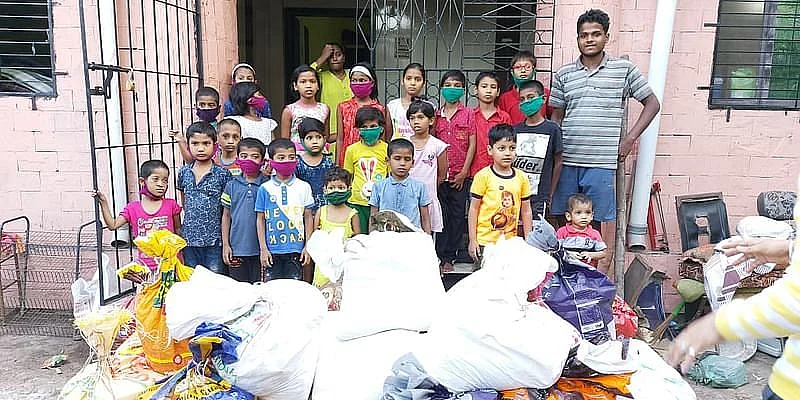Most NGOs faced funds crunch during 2nd Covid wave when people badly needed help
The humongous impact of the pandemic on the community required a concerted action of the govt, private sector and civil society. But majority of NGOs had been financially crippled by govt policies

A new civil society report “Civil Society Support to Covid-19 Affected Families: Outreach and Resourcing in the Second Wave” has wondered why, despite the Government of India think-tank NITI Aayog soliciting support from civil society organisations (CSOs) for fighting the pandemic, “financial and legal regulatory frameworks” constricted access to resources, especially by small and medium size organisations, during the second wave.
Prepared last month and published by five high profile NGOs – Participatory Research in Asia (PRIA), Unnati, Centre for Youth and Social Development (CYSD), Samarthan and Sahbhagi Shikshan Kendra – the report asks, “Is it fair to ignore the constraints imposed by the public laws and policies on the CSOs and still expect them to deliver public good at the time of crises?”
Based on a survey of 583 respondents working with 577 CSOs – big, medium and small – the report, authored by by Kaustuv Kanti Bandyopadhyay, Muskan Chawla, S Ram Aravind and Yashvi Sharma, insists, the resource crunch “is something to be pondered by all who could have made a difference with their resource and policies – the government, the international donors, philanthropists of all origins and corporate social responsibility programmes.”
“Is it good enough to find and fund a few largest CSOs with impressive individual outreach or better to work with several small ones to reach out to the farthest and hard to reach communities with similar impressive outreach?”, the report queries.

Underlining that that “the humongous impact of the pandemic on the community required a concerted action of the government, private sector and civil society”, the report says, “However, a lot had changed in the resource and operating environment in which the CSOs were operating at a time when the second wave of pandemic occurred.”
Thus, it says, “The amendments to Foreign Contribution Regulatory Act, 2020 had barred the CSOs to re-grant foreign resources to other organisations. It had a colossal effect on the small and medium size organisations which often accessed resources from bigger organisations who were in direct interface with the donors.”
“The biggest challenge faced by 92 percent of the total respondent CSOs was unavailability of financial resources,” the report regrets, pointing out, “Majority of the organizations (78%) reported lack of donor support or flexibility as major constraint.” It adds, “The financial crunch curtailed their operations.”
Revealing how during the second wave of pandemic, the CSOs found themselves struggling with resources, the report says, a large number of the organisations (42 percent) had to use their own resources to engage in relief and community support activities, while 40 percent respondent CSOs were unable to raise any new resources to support this work.

Further, only 7 percent CSOs managed to receive Indian corporate social responsibility (CSR) funding for pandemic disaster alleviation during the second wave, 6 percent CSOs reported that they mobilised resources from the local community. As for foreign donor contribution, both individual and organisational, assistance from Indian diaspora, and other sources, this “accounted for a meagre (6%) portion of resources raised for purpose of relief.”
Despite lack of resources, which “affected the small and medium size CSOs the most”, the report claims, “Their ability to reach out to the needy families has been commendable” Thus, calculations by the authors suggest, “48,18,761 families have received support from the respondent CSOs”, all of whom “mainly provided food, personal hygiene materials and medical supplies to the needy families.”
The report says, even though most CSOs are “under-staffed, under-resourced, under-protected”, they were immersed in the community. It adds, “More than 200 CSOs had reported health issues among staff due to contraction of virus and more than 50 had reported occurrence of death among staff. However, this did not deter them from continuing community service.”
“The number of families supported by each CSO varies according the existing coverage, capacities and availability resources”, the report says, adding, “Nearly half of the respondent CSOs (44 percent) were able to support 100 to 1,000 families. A little more than one quarter of respondent CSO individually were able to support 1000 to 5,000 families. A few CSOs (6 percent) were able to reach out and provide support to more than 10,000 families.”
Apart from resource crunch, the report says, the challenges the NGOs faced included coordination with panchayati raj institutions (PRIs), municipalities, block and district administrations. Thus, “Nearly one-third of the respondent CSOs also mentioned about lack of cooperation.”
The report reveals, approximately two-third of the CSOs (66 percent) have annual budget less than Rs 1 crore , indicating that these are smaller grassroots organisations. Only one-fifth of the respondent CSOs have annual budget of more than Rs 1 crore and another one-fifth with more than 5 crore. A few CSOs have annual budget of more than 5 crore.
The report says, despite enormity of the crisis, “The CSOs with almost no additional support stood steadily with the community and made available the basic necessities. This ranges from food, medical supplies, personal hygiene materials, emotional support, cash support and crucial and authentic information relevant to the affected community.”
It adds, “The value addition of CSOs was more than spectacular because of their consistent commitments and proximity to the communities. One could imagine, had they been equipped with more resources, a larger number of distressed families could have received essential support.”
(The report first appeared in countreview.net)
Follow us on: Facebook, Twitter, Google News, Instagram
Join our official telegram channel (@nationalherald) and stay updated with the latest headlines
